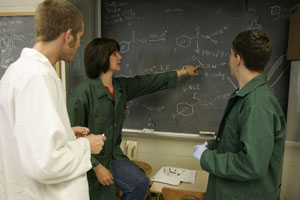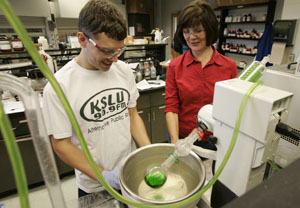A Cycle of Continuous Feedback
On the home page:
Click on the thumbnail for a larger picture.
Chemistry professor Debra Dolliverworks in Southeastern's organic chemistry lab with undergraduate research assistants Richard P. Rucker (Pearl River)and Smitty Smith (Amite). Through a Louisiana Board of Regents grant, Dr. Dolliver and her student assistants are researching new methods of synthesizing oxime ethers.
Richard P. Rucker, Chemistry major, ACS concentration
Smitty Smith, Biological Sciencesmajor, Organismal and Integrative Biology concentration
Dr. Debra Dolliver,Assistant Professor, Department of Chemistry and Physics
Richard P. Rucker has been working in Dr. Debra Dolliver’s organic chemistry lab for
the past year, assisting her in researching the development of new methods of synthesizing
oxime ethers, atom groupings that can increase the biological activity of certain
molecules.
The experience, according to the Pearl River junior, is more than just a job; it
pays off in the classroom as well.
 |
Dolliver concurs: “Anytime you can practically apply things you’ve learned in the classroom, you turn the level of education up a notch. Working in the lab certainly augments classroom understanding.”
In addition, she says, it’s in the lab where students really acquire a love for science.
“Having experience in a research lab elevates the students’ level of understanding
and interest in chemistry,” she says. “They become very fluent in laboratory techniques
and instrumentation. Having this experience can make a student a much-sought-after-commodity
in the job market and in graduate schools.”
Rucker is helping Dolliver in her research work, which is funded by a $90,196 grant
from the Louisiana Board of Regents.
|
|
“Because of their biological effects, oxime ethers are beginning to be incorporated into many compounds used in agriculture and pharmaceuticals that have antibacterial, antiviral and antifungal effects,” Dolliver explains. “Our intent is to discover new and controlled routes for making oxime ethers. These routes offer the potential to make pharmaceutical and agricultural compounds in more efficient ways.”
Dolliver said her research students are learning the fundamental techniques for synthesis, analysis and characterization of organic compounds. Each student is given a project and works with her and the other students in the group to achieve assigned goals.
For Rucker, working with a respected researcher like Dolliver has been invaluable.
“It’s intellectually refreshing and invigorating to discuss a subject you love with an expert who shares this passion,” he said. “Dr. Dolliver has challenged me to challenge myself and I experience the rewards of this every day.”
More Homepage Stories...


